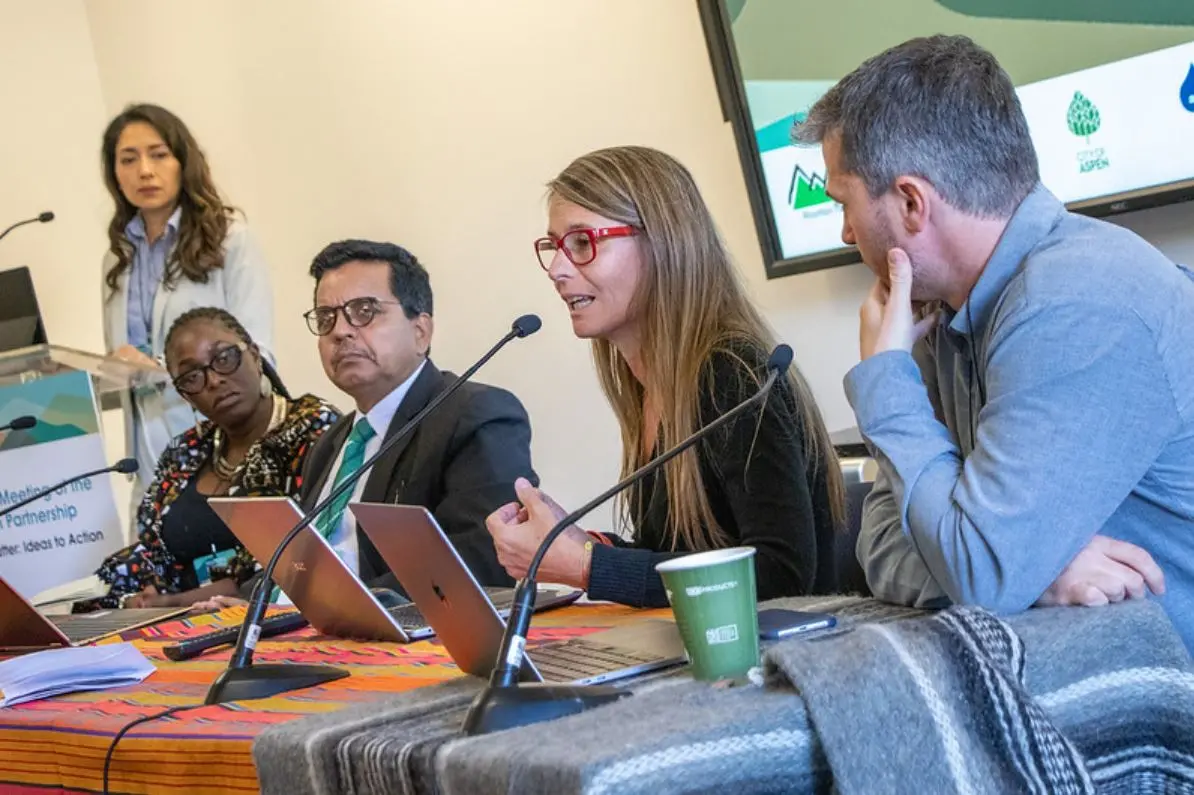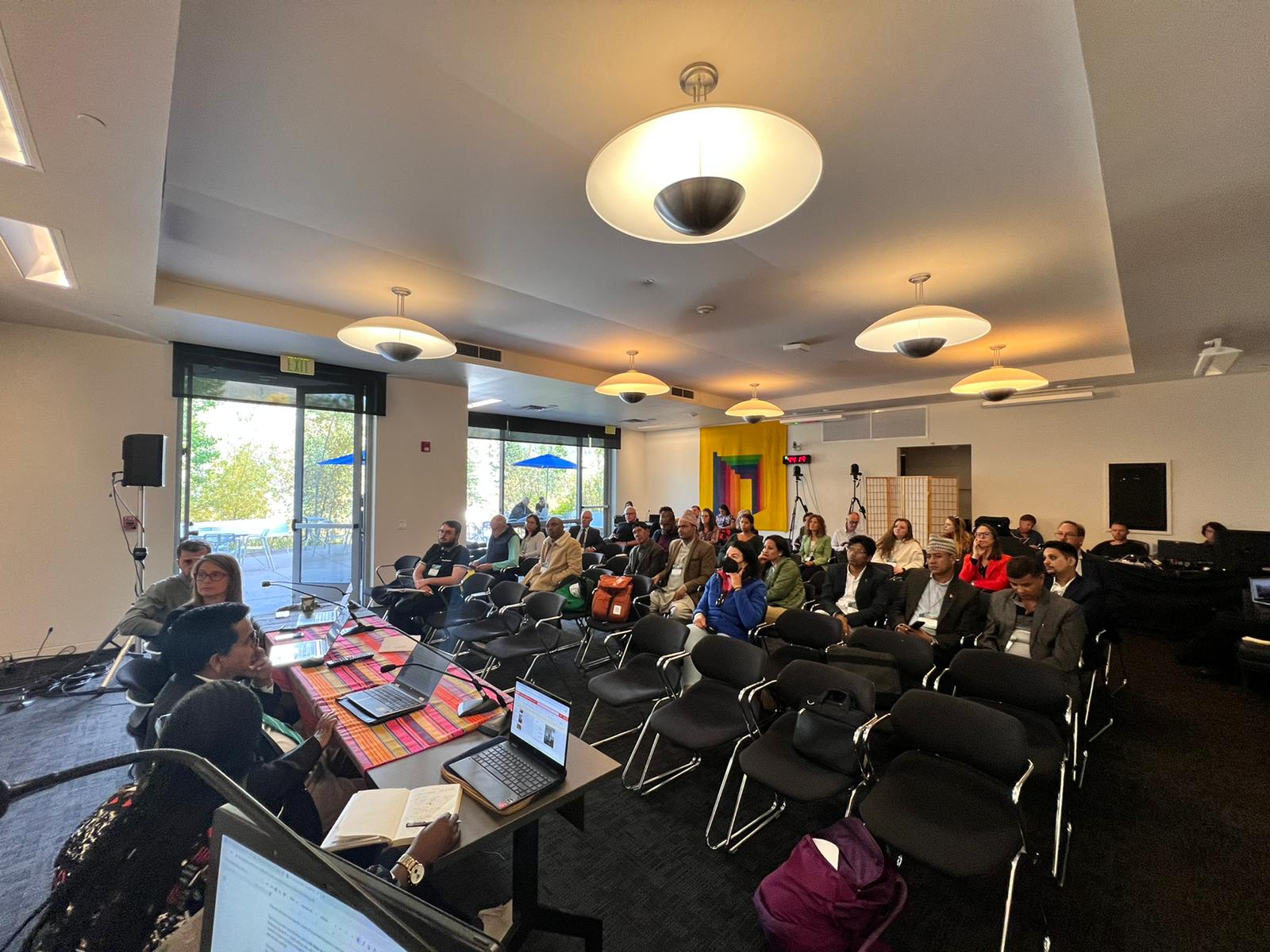Ms. Maureen Anino, from the Ministry of Water and Environment in Uganda says:
In Africa, you cannot talk about conservation without talking about livelihood. A poor person cannot conserve the environment.
This side event highlighted the various land management practices in mountain regions that can build adaptive capacities, reducing the risks posed by climate change on communities. UNESCO and IUCN presented experiences from conservation and restoration projects to demonstrate the socio-economic opportunities generated by mapping and EbA, hosting a panel of expert speakers.

Photo: ©Matt Ten Bruggencate/Earth Negotiations Bulletin
UNESCO and IUCN’s side event, “Sustainable Land Management, Biodiversity Conservation and Ecosystem-based Adaptation: generating sustainable socio-economic opportunities for mountain communities,” focused on different approaches and experiences to land management in the mountains for ensuring the recovery and maintenance of key ecosystem services and the sustainable management and use of biodiversity, including agro-biodiversity, aiming to enhance the adaptive capacity and reduce the vulnerability of mountain communities to climate change.
Through concrete experiences from the World Network of Mountain Biosphere Reserves and the IUCN’s Scaling Up Mountain Ecosystem-based Adaptation programme in six countries in Africa, South America and Asia, the event showed how conservation and restoration measures can generate environmentally and culturally sustainable socio-economic opportunities for the local community, including benefits for adaptation.
During the side event, the main impacts of Scaling Up Mountain Ecosystem-based Adaptation and the new Mountain Biosphere Reserve Network of the MAB Programme were also presented.
The event hosted the following panellists:

Ms. Maureen Anino, from the Ministry of Water and Environment in Uganda says:
In Africa, you cannot talk about conservation without talking about livelihood. A poor person cannot conserve the environment.
The Mountains Biosphere Reserve Network, as part of the MAB Programme, seeks to connect biosphere managers and scientists in order to work closely with experts and develop research not just on biosphere reserves but for biosphere reserves. It is an open network for places that may identify with multiple biospheres so that the Network can be as inclusive and comprehensive as possible. For instance, some countries may primarily present and identify themselves as islands but have mountains that play a central role in the country’s ecosystem. By prioritizing research for mountains, the Network can engage collaboration and promote sharing experiences and knowledge, all while establishing strategic partnerships around the world.
One of the Network’s Mountain Biosphere Reserves resides in South Africa, called the Gouritz Cluster Reserve. The site is characterized by high levels of biodiversity, including many endemic plant species and threatened invertebrates. It also a migratory route for large mammals, such as the leopard, and serves as a nursery for marine species. Nominating a mountain range as a biosphere reserve can provide more visibility for its ecosystem and communities, while generating more funding opportunities for the region and nation, connecting them with other member nations.
Sustainable land management and its various approaches can greatly benefit and enhance biodiversity and livelihoods, and there is a need for multipronged policies and actions that combine context-specific economic innovations with ecosystem-based approaches, creating competitive opportunities for future generations. As part of the Scaling-up Mountain EbA programme, Ecosystem-based adaptation (EbA) has played a vital role in conservation and increasing socio-economic opportunity in both Nepal and Uganda. Organic farming and livestock care in the Panchase region in Nepal has led to sustainable farming practises for mountain farmers, such as biogas production. In Chilime, increased plant nurseries led to an increased utilisation and sustainable cultivation of medicinal plants, aiding conservation in the region. In Uganda’s Mt. Elgon region, community groups, especially women groups, were trained to replicate soil management practices and agro-forestry, providing essential resources (e.g., firewood, food, seed and income) for communities. Both country projects sought to involve everyone in their respective communities, especially regarding policymaking and ecosystem restoration.
One key lesson learned from Uganda was that in order to have successful implementation for climate change adaptation, participatory approaches that involve all stakeholders from the beginning must be adopted. Increased support from national and international governments for EbA contributes to its long-lasting success, allowing further opportunities for technical support to develop sustainable land and forest management plans. It is also equally important to consider community needs, time and resources so that communities can truly own the EbA initiatives. It is here that Indigenous knowledge can be applied and shared with stakeholders, aiding in the development of research to support decision-making and collaboration amongst stakeholders.
View the report for the 6th Global Meeting of the Mountain Partnership here. To learn more about the projects in the two flagship countries, visit Nepal’s country brief and Uganda’s country brief.
Since the conclusion of the Scaling-up Mountain EbA programme, IUCN has published the programme’s various achievements and lessons learned, alongside country briefs for each of the 3 flagship and 3 expansion countries. These materials are accessible on the Scaling-up Mountain EbA page.
IUCN also developed two publications to support Ecosystem-based Adaptation: Catalogue of Ecosystem-based Adaptation measures in mountains and Handbook System for the Design and Implementation of EbA.